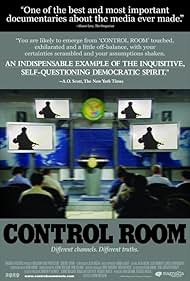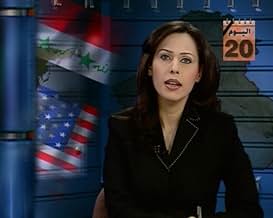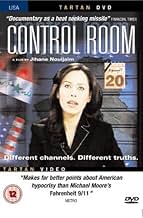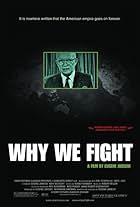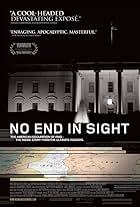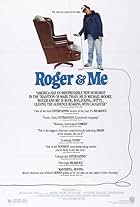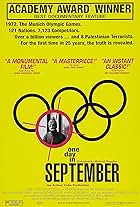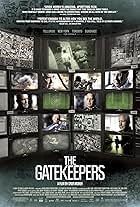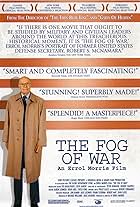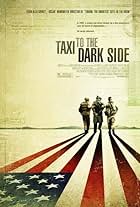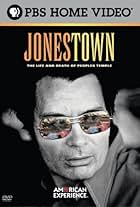IMDb RATING
7.6/10
5.3K
YOUR RATING
A documentary on perception of the United States's war with Iraq, with an emphasis on Al Jazeera's coverage.A documentary on perception of the United States's war with Iraq, with an emphasis on Al Jazeera's coverage.A documentary on perception of the United States's war with Iraq, with an emphasis on Al Jazeera's coverage.
- Awards
- 9 wins & 10 nominations total
Josh Rushing
- Self
- (as Lt. Josh Rushing)
George W. Bush
- Self
- (archive footage)
Donald Rumsfeld
- Self
- (archive footage)
- Director
- Writers
- All cast & crew
- Production, box office & more at IMDbPro
Storyline
Did you know
- Quotes
Lt. Josh Rushing: It makes me hate war, but it doesn't make me believe that we're in a world that can live without war yet.
- SoundtracksControl Room Intro Theme
Written by Kinan Azmeh and Dinuk Wijeratne on a theme by Béla Bartók (as Bartok)
Performed by Kinan Azmeh and Dinuk Wijeratne
Courtesy of Kinan Azmeh and Dinuk Wijeratne
Featured review
They are a horde of sand monkeys screaming hysterically, jumping up and down, waving their fists in the air, and they all have their heads wrapped in tablecloths stolen from Italian restaurants -- right? Well, not quite, according to this documentary from Noujaim, which focuses on the producers and staff of the much-maligned al Jaziera satellite news channel which broadcasts to the Arab-speaking world.
The reporter we get to know best, a big guy who looks like Luciano Pavarotti in makeup for a performance of Otello, and who speaks English fluently (his wife is an Englishwoman), is like most other reporters of whatever channel or nationality -- practical, cynical, and good humored. He doesn't give us an anti-American diatribe. He's way too cool for that. He's watching, for instance, the tape of a demonstration in which yelling, leaping children surround some Americans entering Baghdad and he's listening to the English translation. The children are shouting "Allah" something or other and the on screen translator comments that the kids are saying "God be with you Americans!" The reporter smiles and turns to the camera, explaining that what the kids are actually saying is, "God damn you Americans." He has a keen sense of irony.
So does another translator who is watching Bush's "Mission Accomplished" speech on live TV and giving the Arabic translation to the audience. When Bush is finally finished telling us how successful we and our allies have been, how the war has ended, the translator shuts off his mike, lowers his face and wordlessly chuckles.
At another point, after the victory, Iraqis are seen breaking into a bank, emerging which armfuls of money, which they then gleefully tear up and toss in the air. Watching this on TV an al Jaziera staff member remarks that these are Kurds and they're tearing up the dough because it's the new Dinar with Saddam's picture, and in that region they've always used the old pre-1991 currency. At the same time, elsewhere, an American newsman (from CNN, I think) is watching the scene and calls to someone to find out what it is these looters are tearing up. Is it money, or what? And when asked at a briefing to explain why these looting incidents are going on in the destroyed and chaotic cities, an American general replies that this was going on under the noses of the Iraqis themselves. (In other words, some Iraqi authority should have put a stop to it.) But the film makers are mistaken if they think that most of this isn't already known to American audiences. The problem isn't so much that American audiences were ignorant of some of these things, but that they preferred the perception to the substance. Take the concept of victory. The perception is "the liberated people" pulling down a statue of the reviled Hussein. That's part of the substance too. Another part of the substance is videotape of dead and bloody American bodies sprawled on a cement floor, a part that, like the coffins arriving at Dover AFB, we'd rather exclude. Al Jaziera showed both scenes.
I don't mean any of this to sound too simple minded. It's a thorny problem. Exactly how do you edit the substance so that what appears in the media is acceptable -- in the sense that it doesn't get you fired or killed. The journalist's code of course is to be "objective," but objectivity itself depends on perception.
A sympathetic Marine captain, seen in several interviews, doing his best to answer unanswerable questions, poses the conundrum in its most basic form. Something like, "I was watching American TV and saw shots of these bodies of dead civilians, including kids, and I thought, that's too bad. Then I ate dinner and went to sleep. Recently I was watching al Jaziera and saw shots of bodies of dead American GIs, and I really got MAD. Then I thought, maybe THEY feel the same way." The officer is a surprisingly earnest guy in an impossible job. He's trying to learn Arabic, is terribly flattered when asked to come home and have dinner with Pavarotti and his English wife. His happiness at being treated amicably is almost palpable.
If you put the wrong material on the air, you're liable to pay for it. Al Jaziera's headquarters in Baghdad was bombed during the war and one of its reporters killed. Another Arab news agency was bombed at the same time, and a hotel too. The financial reporter from al Jaziera was banned from the New York Stock Exchange too. (Not mentioned in this film.) We're going to have to wait for another documentary to explain the reasons for that, I guess.
The reporter we get to know best, a big guy who looks like Luciano Pavarotti in makeup for a performance of Otello, and who speaks English fluently (his wife is an Englishwoman), is like most other reporters of whatever channel or nationality -- practical, cynical, and good humored. He doesn't give us an anti-American diatribe. He's way too cool for that. He's watching, for instance, the tape of a demonstration in which yelling, leaping children surround some Americans entering Baghdad and he's listening to the English translation. The children are shouting "Allah" something or other and the on screen translator comments that the kids are saying "God be with you Americans!" The reporter smiles and turns to the camera, explaining that what the kids are actually saying is, "God damn you Americans." He has a keen sense of irony.
So does another translator who is watching Bush's "Mission Accomplished" speech on live TV and giving the Arabic translation to the audience. When Bush is finally finished telling us how successful we and our allies have been, how the war has ended, the translator shuts off his mike, lowers his face and wordlessly chuckles.
At another point, after the victory, Iraqis are seen breaking into a bank, emerging which armfuls of money, which they then gleefully tear up and toss in the air. Watching this on TV an al Jaziera staff member remarks that these are Kurds and they're tearing up the dough because it's the new Dinar with Saddam's picture, and in that region they've always used the old pre-1991 currency. At the same time, elsewhere, an American newsman (from CNN, I think) is watching the scene and calls to someone to find out what it is these looters are tearing up. Is it money, or what? And when asked at a briefing to explain why these looting incidents are going on in the destroyed and chaotic cities, an American general replies that this was going on under the noses of the Iraqis themselves. (In other words, some Iraqi authority should have put a stop to it.) But the film makers are mistaken if they think that most of this isn't already known to American audiences. The problem isn't so much that American audiences were ignorant of some of these things, but that they preferred the perception to the substance. Take the concept of victory. The perception is "the liberated people" pulling down a statue of the reviled Hussein. That's part of the substance too. Another part of the substance is videotape of dead and bloody American bodies sprawled on a cement floor, a part that, like the coffins arriving at Dover AFB, we'd rather exclude. Al Jaziera showed both scenes.
I don't mean any of this to sound too simple minded. It's a thorny problem. Exactly how do you edit the substance so that what appears in the media is acceptable -- in the sense that it doesn't get you fired or killed. The journalist's code of course is to be "objective," but objectivity itself depends on perception.
A sympathetic Marine captain, seen in several interviews, doing his best to answer unanswerable questions, poses the conundrum in its most basic form. Something like, "I was watching American TV and saw shots of these bodies of dead civilians, including kids, and I thought, that's too bad. Then I ate dinner and went to sleep. Recently I was watching al Jaziera and saw shots of bodies of dead American GIs, and I really got MAD. Then I thought, maybe THEY feel the same way." The officer is a surprisingly earnest guy in an impossible job. He's trying to learn Arabic, is terribly flattered when asked to come home and have dinner with Pavarotti and his English wife. His happiness at being treated amicably is almost palpable.
If you put the wrong material on the air, you're liable to pay for it. Al Jaziera's headquarters in Baghdad was bombed during the war and one of its reporters killed. Another Arab news agency was bombed at the same time, and a hotel too. The financial reporter from al Jaziera was banned from the New York Stock Exchange too. (Not mentioned in this film.) We're going to have to wait for another documentary to explain the reasons for that, I guess.
- rmax304823
- Mar 5, 2005
- Permalink
Details
- Release date
- Country of origin
- Languages
- Also known as
- Контрольная комната
- Production company
- See more company credits at IMDbPro
Box office
- Gross US & Canada
- $2,589,616
- Opening weekend US & Canada
- $27,125
- May 23, 2004
- Gross worldwide
- $2,724,826
Contribute to this page
Suggest an edit or add missing content

